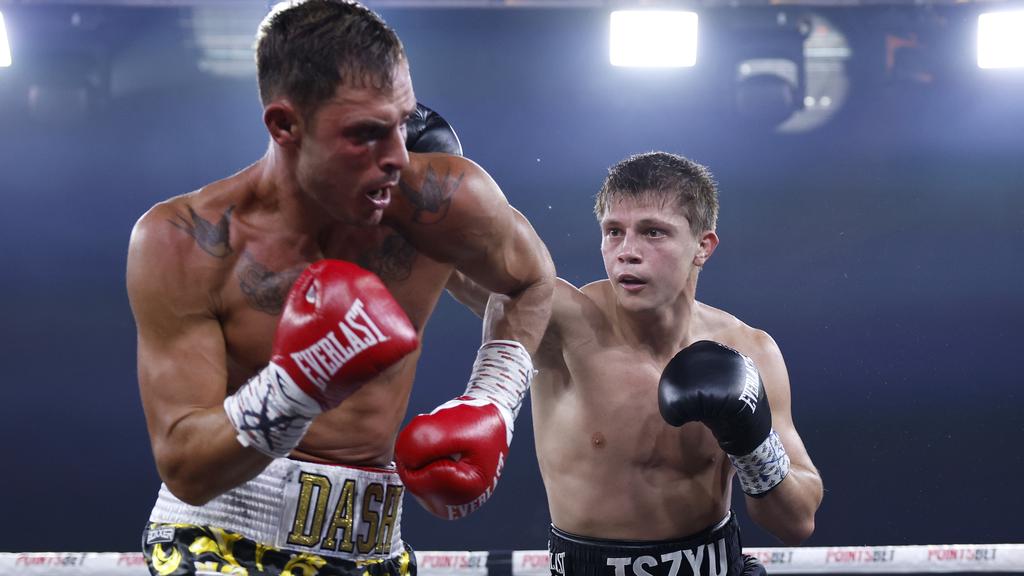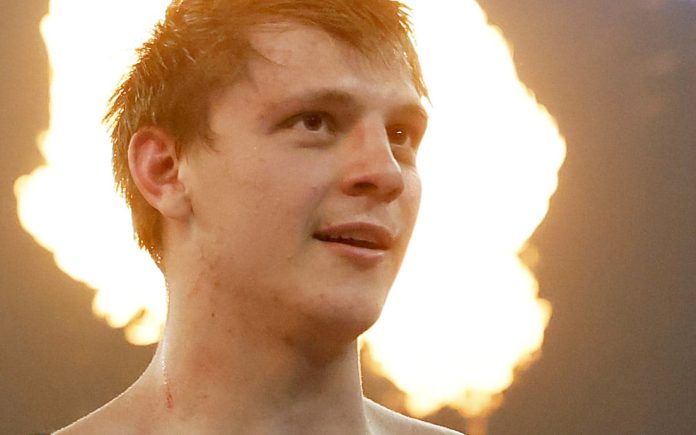Nikita Tszyu. Photo by Mark Evans/Getty Images
An updated version of this article will appear in the next issue of The Ring.
Llike a horror film, many watched March’s gruesome unified world title fight between Tim Tszyu and Sebastian Fundora through their fingers.
Conversely, Tim’s younger brother, Nikita, sat 12 bloody rounds behind, wide-eyed and sputtering with envy.
It wasn’t the opportunity, the titles or the purses that so mesmerized the fellow professional boxer – rather the brutal cut, the broken nose and the resulting red mess that so stained the Las Vegas ring it would have been fitting to replace the ropes with crime scene tape.
“Seeing all the blood, it was quite exciting for me,” Nikita said.
“I’m drawn to that type of gruesomeness. I was jealous! At the end of the fight he (Tim) cut his glove and he licked it and I was like, ‘Hell yeah, thanks.’

Tim Tszyu and Sebastian Fundora engage during their bloodbath in March. (Photo by Tayfun Coskun/Anadolu via Getty Images)
You see, Nikita Tszyu is a little different.
Two and a half years ago, at the press conference to announce his debut fight, the younger Tszyu offered a quote that inadvertently spawned a ring name.
“Some people described my brother as more than a surgeon and they described me as a butcher. We do the same type of work, but we do things in a different way. I’m a bit more messy in that sense,” said Nikita.
At 26, “The Butcher” is three years younger than Tim and too young to remember much from the time when their father, Kostya, was the undisputed king of the junior welterweight division and one of boxing’s most compelling figures.
The Tszyu brothers described their upbringing as driven by “army sergeant” Kostya’s military parenting style – all discipline, punctuality and respect.
“I remember coming back home after coming second in cross country,” recalls Tim. “After that, dad knocked on the door every morning at 05:15 for a run, and I came first every year from then on.
“You can’t be a blurger in this family—that’s for sure!”

Kostya Tszyu, with a young Nikita and Tim, poses with a Boa Constrictor during a press conference (held at a zoo in Sydney) for his 2005 showdown with Ricky Hatton. (Photo by Mark Nolan/Getty Images)
But when the boys were alone, sparks and punches flew.
“My childhood was a constant nosebleed,” admits Nikita, whose grandfather Boris has now forbidden him to spare his brother.
“I was a bit of a loner as a child. I always did my own thing. I used to collect redback spiders in my backyard and put them in boxes and suffocate them. I feel sorry for my mother. She was the one who handled it all. They took me to a psychologist when I was younger and they said, ‘There’s really nothing wrong with him, he just needs attention.’
Despite his dubious hobbies, Nikita was a national standout as an amateur boxer in Sydney and, according to many, the more naturally gifted of the brothers. However, he had wings to spread, so he flew away from boxing to pursue a career in architecture.
It took seven years, but finally Tszyu hands are meant to make fists, not drawings, and watching the rise of his brother from afar only fueled Nikita’s inevitable return to the ring.
While Tim debuted in relative obscurity, not appearing on a major television show until his thirteenth professional fight, his role in returning the Tszyu name to mainstream prominence in Australia meant that Nikita was cast in a major role from the start .
In March 2022, “The Butcher” stopped Aaron Stahl in the second round of a scrappy but violent debut in Brisbane, and there was immediate national interest.
Of course the Tszyu surname and the resulting hype helped a lot, but so did the attitude, recklessness and punch. Inside and outside the ring, Nikita Tszyu is must-see TV.
Nikita is a southpaw, and while he doesn’t share Tim’s uncanny facial similarities to Kostya, there is a striking similarity in the sincerity of his punches. The blows look and sound heavy and the reaction of opponents is dramatic.
Furthermore, Nikita’s fighting style is highly entertaining – not so much “hit and don’t get hit” as “get hit and hit back harder”.

Nikita Tszyu takes it to Benjamin Bomber en route to a first round stoppage at Margaret Court Arena on May 24, 2023 in Melbourne, Australia. (Photo by Robert Cianflone/Getty Images)
“I heard (Gennadiy) Golovkin say a quote. He said that sometimes he allows people to beat him just so he can give others hope. I don’t call myself Golovkin, but I wanted to say that quote,” Nikita said.
“When I watch a fight, I hate it when it’s one-sided. Even though I like the guy I’m watching, I want them to get hurt. This is the business of entertainment and the main character has to go through adversity.”
Tim articulates the contrast in the brothers’ styles, inside and outside the boxing ring.
“In life I will think before I act. Nikita does, then think,” Tim said. “Same thing in the ring. But most of the time when he does, it’s fireworks.
“Expect the unexpected from this kid.”
The first nine fights of Nikita’s paid career have been compelling, and while he remains undefeated, there has been plenty of adversity. He was badly rocked in the final round of an early win over Ben Horn, had to come off the canvas in the opening round before stopping Dylan Biggs, and took big hits in brutal wins over Jack Brubaker and Danilo Creati.
“I take the shots, but I’m still a rookie. I learn along the way. Two and a half years back in the sport! I’m in, like, my teenage phase right now. I haven’t fully matured yet – I know a bit about the power of my body – but I’m still a bit reckless,” said Nikita.
“The Ben Horn one – why did I try to knock him out in the last 30 seconds when I won the whole fight? This is a rookie mistake by me. Brubaker – I got a headache! I was also hit by a nice shot, but I recovered immediately. And the Creati one – yeah he hit me with a shot but I felt good – I just tried to clinch him but he was a slippery guy and it seemed like I was all over the place.”

Nikita Tszyu goes on the attack against Danilo Creati – Photo courtesy of No Limit Boxing
It’s the recklessness that simultaneously engages crowds, provides ammunition for critics and terrifies a watching brother.
“I didn’t understand what I was in for. But I understood when I watched Nikita’s first fight. Man, it’s nerve wracking! Stressful. It’s very difficult,” said the older Tszyu brother.
“The first few fights I was out of control. I sat down and thought, ‘You know what, I really need to work on this!'” added Tim.
Father Kostya has not yet attended any of Nikita’s professional fights. And while they communicate regularly, the 26-year-old hasn’t seen his father in person in five years.
After his final professional fight in 2005, Kostya increased his business interests in Moscow and began spending more time there. Then, in 2008, the family – then-wife Natasha and children Tim, Nikita and Anastasia – joined Kostya in moving to Russia. However, the homesick Tszyus never settled and was back in Sydney within a year.
In 2012, Kostya returned permanently to Moscow, where he now lives with second wife Tatiana and the couple’s two young children, and according to Tim is “happy” and “softer”.
The boys seem content with their legendary father’s absence and describe the current relationship as a long-distance friendship; Kostya watches every fight and called Nikita after his most recent fight with advice to stop knocking opponents out with every punch.
Nikita remains a quirky character, with colorful turns of phrase and an intriguing personal philosophy. He remains somewhat of a “loner” who spends much of his time in nature with his three dogs – Lucifer, Hunter and Carlos. But as the dark prince of Australian boxing’s first family, Nikita had to deal with grumbling about the relative ease of his boxing rise. He admits he was privileged but explains well the limitations of that advantage.
“What can I do about it? There is nothing I can do about the privilege I grew up with. I’m not going to deny that, because of course it’s true, but boxing is one of those sports where privilege can only take you so far – you still have to get in there and fight,” said Nikita.
“I’ve had all these fights and I’ve won them. It got me somewhere, but I had to take control myself.”

Nikita Tszyu celebrates after defeating Mason Smith as part of the King of the Castle Fight Night at the Newcastle Entertainment Center on May 11, 2022 in Newcastle, Australia. (Photo by Mark Evans/Getty Images)
Nikita’s tenth professional bout will be a defense of his Australian junior middleweight title against fellow Syneysider Koen Mazoudier on August 28.
Mazoudier has a formidable lead of his own, having come through the amateur system with the Tszyu brothers and seeing Nikita’s rapid rise from the front row. His own life became wildly turbulent at times.
From Blacktown in Sydney’s gritty western suburbs, Mazoudier struggled with addiction and was arrested and sent to a mental health facility only four years ago.
“I had a manic episode and almost sent myself schizophrenic – I was living things that didn’t happen,” explained Mazoudier. “At that point my beautiful partner, Breanna, called the ambulance because she was worried about my health. They just mentioned, ‘Is there anything else we need to know before we go there?’ She said innocently, ‘He’s a professional boxer,’ so now the police are coming instead of the ambulance.
“I was put in a mental health facility for the violent mentally ill – I’ve never been violent outside of boxing. It was quite the prison for a mentally ill person.”
These days, Mazoudier seems every bit the contented husband to Breanna and well-adjusted father to their two children, with another on the way, as he uses his own journey in life and in boxing to help others experiencing mental health issues.
“There are things I’ve had to jump and do that he (Nikita) doesn’t even know exists. For me, this is an advantage for me. When we get to those depths and into that dark, dark pit, I’m going to think about all these things I’ve had to accomplish and get through that he hasn’t even had to look at yet,” Mazoudier said.
With all of that on the table, and with these two particular fighters getting ready to feast, it’s no surprise that the dinner conversation turned awful.
“I’m happy to break bones, tear spleens and rip fucking heads off – whatever I have to do in there,” says Mazoudier. “I’m preparing for war, and I’m going to take that Australian title home. I have children at home, so I’m going to feed on him first, then I’m going to feed my family.”
“We are both willing to die in the ring,” Nikita replied. “It’s a recipe for something cheeky – for something with a parental advisory sticker on it.
“It’s kind of like I’m fighting myself.”

Ben Damon is a well-known journalist, commentator and TV presenter known as the “Voice of Australian Boxing.” He will Tszyu vs. Mazoudier called on Wednesday evening Australian time.



